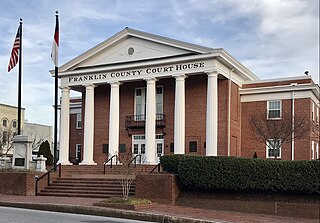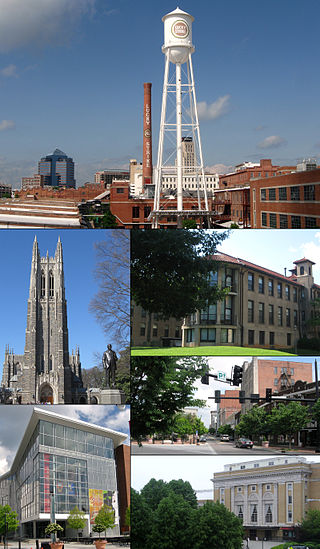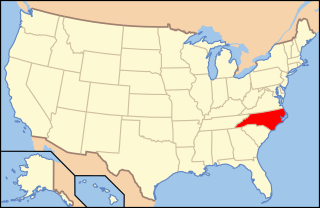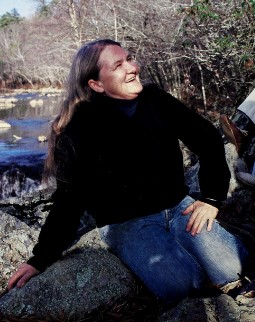
Raleigh is the capital city of the state of North Carolina and the seat of Wake County in the United States. It is the second-most populous city in North Carolina, after Charlotte. Raleigh is the tenth-most populous city in the Southeast, the 41st-most populous city in the U.S., and the largest city of the Research Triangle metro area. Raleigh is known as the "City of Oaks" for its many oak trees, which line the streets in the heart of the city. The city covers a land area of 147.6 sq mi (382 km2). The U.S. Census Bureau counted the city's population as 467,665 in the 2020 census. It is one of the fastest-growing cities in the United States. The city of Raleigh is named after Sir Walter Raleigh, who established the now-lost Roanoke Colony in present-day Dare County.

Wake County is located in the U.S. state of North Carolina. In the 2020 census, its population was 1,129,410, making it North Carolina's most-populous county. From July 2005 to July 2006, Wake County was the 9th-fastest growing county in the United States, with the town of Cary and the city of Raleigh being the 8th- and 15th-fastest growing cities, respectively.

Union County is a county located in the U.S. state of North Carolina. As of the 2020 census, the population was 238,267. Its county seat is Monroe. Union County is included in the Charlotte-Concord-Gastonia, NC-SC Metropolitan Statistical Area.

Johnston County is a county located in the U.S. state of North Carolina. As of the 2020 census, the population was 215,999. Its county seat is Smithfield.

Franklin County is a county located in the U.S. state of North Carolina. As of the 2020 census, the population was 68,573. Its county seat is Louisburg.

Durham County is a county located in the U.S. state of North Carolina. As of the 2020 census, the population was 324,833, making it the sixth-most populous county in North Carolina. Its county seat is Durham, which is the only incorporated municipality predominantly in the county, though very small portions of cities and towns mostly in neighboring counties also extend into Durham County. The central and southern parts of Durham County are highly urban, consisting of the city as well as several unincorporated suburbs. Southeastern Durham County is dominated by the Research Triangle Park, most of which is in Durham County. The northern third of Durham County is rural in nature.

Selma is a town in Johnston County, North Carolina, United States. In 2010, the population was 6,073, and as of 2018 the estimated population was 6,913. Selma is part of the Raleigh-Durham-Cary Combined Statistical Area. The area has a population over 1.7 million residents, though the town of Selma is able to maintain its rural character. The Everitt P. Stevens House, located in Selma, was the site of the last Grand Review of the Confederate Army held on April 6, 1865, after its defeat at the Battle of Bentonville.

Apex is a town in Wake County, North Carolina, United States. At its southern border, Apex encompasses the community of Friendship. In 1994, the downtown area was designated a historic district, and the Apex train depot, built in 1867, is designated a Wake County landmark. The depot location marks the highest point on the old Chatham Railroad, hence the town's name. The town motto is "The Peak of Good Living".

Durham is a city in the U.S. state of North Carolina and the county seat of Durham County. Small portions of the city limits extend into Orange County and Wake County. With a population of 283,506 in the 2020 census, Durham is the 4th-most populous city in North Carolina, and the 74th-most populous city in the United States. The city is located in the east-central part of the Piedmont region along the Eno River. Durham is the core of the four-county Durham-Chapel Hill Metropolitan Area, which had a population of 649,903 at the 2020 census. The Office of Management and Budget also includes Durham as a part of the Raleigh-Durham-Cary Combined Statistical Area, commonly known as the Research Triangle, which had a population of 2,043,867 at the 2020 census.

John Anthony Volpe was an American businessman, diplomat, and politician from Massachusetts. A son of Italian immigrants, he founded and owned a large construction firm. Politically, he was a Republican in increasingly Democratic Massachusetts, serving as its 61st and 63rd Governor from 1961 to 1963 and 1965 to 1969, as the United States Secretary of Transportation from 1969 to 1973, and as the United States Ambassador to Italy from 1973 to 1977. As Secretary of Transportation, Volpe was an important figure in the development of the Interstate Highway System at the federal level.

Ann George Atwater was an American civil rights activist in Durham, North Carolina. Throughout her career she helped improve the quality of life in Durham through programs such as Operation Breakthrough, a community organization dedicated to fight the War on Poverty. She became an effective activist and leader when advocating for black rights, such as better private housing. Atwater promoted unity of the working-class African Americans through grassroots organizations.

Lesbian, gay, bisexual, and transgender (LGBT) persons in the U.S. state of North Carolina may face legal challenges not experienced by non-LGBT residents, or LGBT residents of other states with more liberal laws.
The Royal Ice Cream sit-in was a nonviolent protest in Durham, North Carolina, that led to a court case on the legality of segregated facilities. The demonstration took place on June 23, 1957 when a group of African American protesters, led by Reverend Douglas E. Moore, entered the Royal Ice Cream Parlor and sat in the section reserved for white patrons. When asked to move, the protesters refused and were arrested for trespassing. The case was appealed unsuccessfully to the County and State Superior Courts.

Stephen M. Schewel is an American politician, businessman, and academic. A Democrat, he is the former Mayor of Durham, North Carolina and formerly served on the Durham City Council and as the Vice Chair of the Durham Public School Board. Schewel is also a faculty member at Duke University's Sanford School of Public Policy and a former faculty member at North Carolina Central University. He founded the weekly newspaper Indy Week in 1983, and served as its president until he sold the paper in 2012. In 2010 he co-founded the Hopscotch Music Festival.

George Wilmarth "Wiley" Nickel III is an American attorney and Democratic politician serving as the U.S. representative for North Carolina's 13th congressional district since 2023.

Nida Allam is an American politician, political activist, and data analyst. She currently serves on the Durham County Board of Commissioners, to which she was elected in 2020, making her the first Muslim woman to serve in public office in North Carolina. Allam is one of five women to serve on the Durham County Board of Commissioners; this is the first time the board has consisted entirely of women in its 139-year history.

Margaret Nygard was a British-American environmentalist and conservationist. Born in British India to a civil servant, she was educated in both India and Britain. During the 1940 and 1941 bombing campaign against Britain, her school was relocated to British Columbia, Canada. Nygard studied English at the University of British Columbia and after her graduation in 1944 briefly became a teacher at the university. She went on to earn a master's degree and a PhD from the University of California, Berkeley. In 1962, she and her family moved to Durham, North Carolina, and became aware of environmental threats to the Eno River. She founded the Eno River Association in 1965, becoming its first president. She naturalised as a United States citizen in 1993.

Interstate 885 (I-885) and North Carolina Highway 885 (NC 885) is an 11.5-mile (18.5 km) auxiliary Interstate Highway and state highway in the U.S. state of North Carolina. It links NC 540 and I-40 to I-85 in the Durham area. The route consists of two previously preexisting segments of freeway—NC 147 to the south and US 70 to the north—connected by the East End Connector, which opened to traffic on June 30, 2022.
Nathan Carter Newbold was the Director of Negro Education in North Carolina State Department of Public Instruction from 1913-1950. Duke University has a collection of his papers.
Jillian Johnson is an American politician and non-profit administrator. Since 2015, she has served on the Durham City Council, and is the first LGBTQ member to be elected to the council. From 2019 to 2021, she served as the Mayor Pro-Temopore of Durham, North Carolina.
















